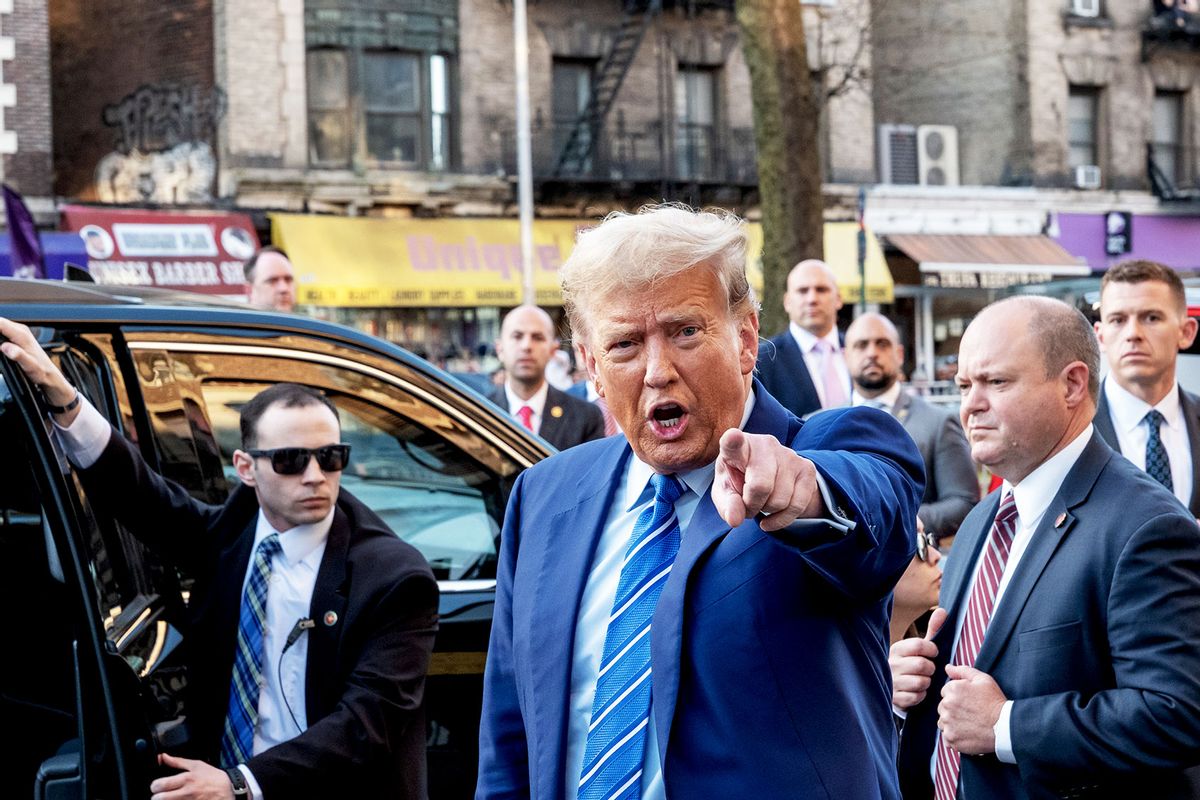You can tell that Donald Trump’s criminal trial is not going well for him by the simple fact that it is actually happening. His alleged co-conspirator, former fixer Michael Cohen, has already served a year in prison for his role in paying off an adult film star to influence the 2016 election – and now he will be testifying that the former president told him to do it.
Trump’s best hope is perhaps that a single juror sympathizes with him and prevents a unanimous verdict. That could happen even with the most stringent vetting. But what if a juror voted to acquit based not on their honest judgment of the facts, or even their own previously concealed bias, but because they feared the consequences, for them personally, of a guilty verdict?
That’s something that New York Supreme Court Justice Juan Merchan says he won’t stand for. On Tuesday, he admonished Trump for “audibly uttering something” and gesturing toward a prospective juror – located about 12 feet from the former president at the time of the outburst – who had been questioned about having shared a video on Facebook of celebratory crowds on the day of the 2020 election. The juror, a woman who was ultimately dismissed, had argued she could still be impartial, maintaining that the video was not intended to be a partisan statement.
“I won’t tolerate that,” Merchan told Trump’s attorney, Todd Blanche. “I will not have any jurors intimidated in this courtroom. I want to make that crystal clear.”
Whether Trump has the ability to comport himself with dignity has been a major concern – not just for the judge, but for his own defense team. It is of course unprecedented for a criminal defendant to be a former U.S. president, and good reason to bar anyone from hectoring a potential juror, no competent legal counsel would suggest in-court bullying is an effective means of achieving a desired outcome. What Tuesday’s episode suggests is that no, of course Trump can’t behave like a responsible adult.
Appearing on MSNBC, Catherine A. Christian, a trial lawyer who previously served in the Manhattan District Attorney’s Office, was asked by anchor Chris Hayes whether she had ever seen a defendant try to engage a prospective juror who could ultimate decide their fate.
“No – and I’m not making light of this – only the mentally unwell ones,” Christian said. “That’s the only time you see criminal defendants acting out, literally, and then you sort of understand it.”
There’s a reason it’s considered the “third rail” of criminal proceedings, Karen Agnifilo, a former assistant Manhattan district attorney, told CNN.
"The third rail is if anyone starts to make the jury feel any kind of intimidation whatsoever,” she said, noting that “the jury has to be protected at all costs and not just for safety reasons.” That is, jurors should only ever have to think about the facts of the case, not a personal interaction with a defendant – and that’s why no judge will tolerate it, she explained.
"Trump can make comments about the judge, about the court, about the D.A., but you do anything involving the jurors you're going to see a very swift reaction,” she said.
We need your help to stay independent
While Trump was reportedly “furious” after he was scolded, the judge he accuses of being “corrupt” and “conflicted” actually did him a favor, according to legal experts.
Lisa Rubin, a legal correspondent at MSNBC, noted that Trump violated courtroom decorum during the first E. Jean Carroll case, pounding the table and making other physical gestures to communicate his displeasure.
“And we all know how that story ended,” Rubin said. “None of the jurors were positively impacted by that performance.” They concluded, in fact, that he was sexual predator.
Trump’s behavior is more likely a product of poor impulse control than a cynical or indeed nefarious strategy – because, again, no good lawyer would recommend it.
“His conduct in the courtroom – it's very demonstrative and it’s very emotional at times,” conservative attorney George Conway commented Wednesday on “Morning Joe.” Conway said he doesn’t think Trump “has a complete ability to control himself,” a fact that will cost him.
Again, just look at the last time he did it in the Carroll case, Conway said.
“He basically sat in front of the jury and just showed contempt for the entire process and contempt for the jury,” he said, “which dovetailed nicely with what the other side was trying to prove, which was: This is a bad guy who doesn’t respect anybody and anything, including the law."
Trump, who has appeared to doze off each day of the trial so far, should consider remaining unconscious, former U.S. attorney Joyce Vance commented on her blog. “Trump would do well to sleep more in court if this is the best he can manage when he’s awake,” she wrote.



Shares